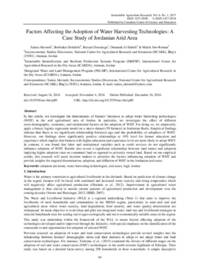Factors Affecting the Adoption of Water Harvesting Technologies: A Case Study of Jordanian Arid Area

Authors:
In this article, we investigate the determinants of farmers’ decisions to adopt water harvesting technologies (WHT) in the arid agricultural area of Jordan. In particular, we investigate the effect of different socio-demographic, economic, and institutional factors on the adoption of WHT. For doing so, we empirically apply a binary logistic regression model on a micro-dataset (59 farmers) in Jordanian Badia. Empirical findings indicate that there is no significant relationship between age and the probability of adoption of WHT. However, our findings show significantly positive relationships at 10% level for farmer education and experience which implies that farmers with higher education and experience level are more likely to adopt WHT. In contrast, it was found that labor and institutional variables such as credit services do not significantly influence adoption of WHT. Results also reveal a significant relationship between land tenure and adoption implying higher adoption rates on communal land as opposed to privately owned land. Based on our empirical results, this research will assist decision makers to prioritize the factors influencing adoption of WHT and provide insights for targeted dissemination, adoption, and diffusion of WHT in the Jordanian arid areas.
